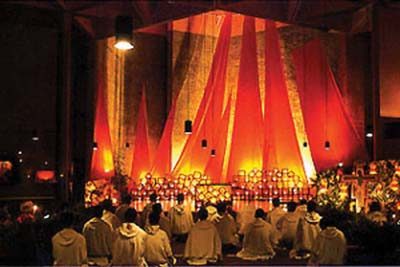 Join Us for Weekly Prayers in the Style of Taizé
Join Us for Weekly Prayers in the Style of Taizé
Grace offers weekly Taizé services at 6pm on Tuesday evenings. After many decades of offering a monthly Sunday evening Taizé styled service it became increasingly clear that the community desired to worship more often. And it has become clear that the world needs a refuge and a place of prayer for peace. The service also moved to 6 in the evening in an effort to increase accessibility.
Discover Peace in a Quiet and Sacred Space
The Taizé styled service is modeled after the renowned community founded by Brother Roger in Taizé, France. Begun in 1940 as a refuge for war torn Europe it has grown to become a worldwide movement encouraging everyone, especially youth, to live in the spirit of kindness, simplicity, and reconciliation.
These ecumenical services are known for their melodic chants and prayers. Although music forms a central part of the service it is mixed with comforting periods of silence allowing for contemplation and listening for God.
Everyone is Welcome
Lighted mostly by candlelight in the 100+ year old stone sanctuary of Grace Church, the vesper light of approaching evening offers a safe and nurturing space for a well deserved time of peace in our hectic lives. Healing prayer is offered throughout the service for you or on behalf of someone else.
If you are a regular practitioner of Taizé or are brand new to this worship style we welcome you! Please join us on Tuesdays at 6pm for forty-five minutes to an hour that is sure to refresh you, away from the busy-ness of everyday life and in a space of solitude that can prepare you to offer more peace to the world. Grace is located at 871 Merrimon Avenue in North Asheville where parking is always free.
What is Taizé
The  Taizé Community is an ecumenical Christian monastic fraternity in Taizé, Saône-et-Loire, Burgundy, France. It is composed of more than one hundred brothers, from Catholic and Protestant traditions, who originate from about thirty countries around the world. It was founded in 1940 by Brother Roger Schütz, a Reformed Protestant.
Taizé Community is an ecumenical Christian monastic fraternity in Taizé, Saône-et-Loire, Burgundy, France. It is composed of more than one hundred brothers, from Catholic and Protestant traditions, who originate from about thirty countries around the world. It was founded in 1940 by Brother Roger Schütz, a Reformed Protestant.
Taizé has become one of the world’s most important sites of Christian pilgrimage, with a focus on youth. Over 100,000 young people from around the world make pilgrimages to Taizé each year for prayer, Bible study, sharing, and communal work. Through the community’s ecumenical outlook, they are encouraged to live in the spirit of kindness, simplicity and reconciliation.

Today, the Taizé Community is made up of about hundred brothers, Catholics and from various Protestant backgrounds, coming from around thirty nations. By its very existence, the community is a “parable of community” that wants its life to be a sign of reconciliation between divided Christians and between separated peoples.
The brothers of the community live solely by their work. They do not accept donations. In the same way, they do not accept personal inheritances for themselves; the community gives them to the very poor. Over the years, young adults have been coming to Taizé in ever greater numbers; they come from every continent to take part in weekly meetings.
The community has sought to include people and traditions worldwide. They have sought to demonstrate this in the music and prayers where songs are sung in many languages, and have included chants and icons from the Eastern Orthodox tradition. The music emphasizes simple phrases, usually lines from Psalms or other pieces of Scripture, repeated.
Ecumenical services based on this model and music are held in many churches throughout the world.
Meditative Singing
 Singing is one of the most essential elements of worship. Short songs, repeated again and again, give it a meditative character. Using just a few words they express a basic reality of faith, quickly grasped by the mind. As the words are sung over many times, this reality gradually penetrates the whole being. Meditative singing thus becomes a way of listening to God. It allows everyone to take part in a time of prayer together and to remain together in attentive waiting on God, without having to fix the length of time too exactly.
Singing is one of the most essential elements of worship. Short songs, repeated again and again, give it a meditative character. Using just a few words they express a basic reality of faith, quickly grasped by the mind. As the words are sung over many times, this reality gradually penetrates the whole being. Meditative singing thus becomes a way of listening to God. It allows everyone to take part in a time of prayer together and to remain together in attentive waiting on God, without having to fix the length of time too exactly.
To open the gates of trust in God, nothing can replace the beauty of human voices united in song. This beauty can give us a glimpse of “heaven’s joy on earth,” as Eastern Christians put it. And an inner life begins to blossom within us.
These songs also sustain personal prayer. Through them, little by little, our being finds an inner unity in God. They can continue in the silence of our hearts when we are at work, speaking with others or resting. In this way prayer and daily life are united. They allow us to keep on praying even when we are unaware of it, in the silence of our hearts.
The Value of Silence
Three times a day, everything on the hill of Taizé stops: the work, the Bible studies, the discussions. The bells call everyone to church for prayer. Hundreds or even thousands of mainly young people from all over the world pray and sing together with the brothers of the community. Scripture is read in several languages. In the middle of each common prayer, there is a long period of silence, a unique moment for meeting with God.

How is it possible to reach inner silence? Sometimes we are apparently silent, and yet we have great discussions within, struggling with imaginary partners or with ourselves. Calming our souls requires a kind of simplicity: “I do not occupy myself with things too great and too marvelous for me.” Silence means recognizing that my worries can’t do much. Silence means leaving to God what is beyond my reach and capacity. A moment of silence, even very short, is like a holy stop, a sabbatical rest, a truce of worries.
Remaining silent, we trust and hope in God. One psalm suggests that silence is even a form of praise. We are used to reading at the beginning of Psalm 65: “Praise is due to you, O God”. This translation follows the Greek text, but actually the Hebrew text printed in most Bibles reads: “Silence is praise to you, O God”. When words and thoughts come to an end, God is praised in silent wonder and admiration.
When we are agitated and restless, we have so many arguments and reasons not to forgive and not to love too easily. But when we “have calmed and quieted our soul”, these reasons turn out to be quite insignificant. Maybe we sometimes avoid silence, preferring whatever noise, words or distraction, because inner peace is a risky thing: it makes us empty and poor, disintegrates bitterness and leads us to the gift of ourselves. Silent and poor, our hearts are overwhelmed by the Holy Spirit, filled with an unconditional love. Silence is a humble yet secure path to loving.
Visit Us
871 Merrimon Ave.
Asheville, NC 28804
Regular office hours are Monday and Thursday, 9-3 and Wednesdays 9-12 excluding holidays.
Service Times
RITE II 10:30am
Choral and Family Holy Eucharist
Taizé 6:00pm Tuesday
Ecumenical music and prayers in the Taizé tradition
Latest Sermon
- Fourth Sunday in Lent, March 30, 2025 – Rev. RiceMarch 30, 2025

